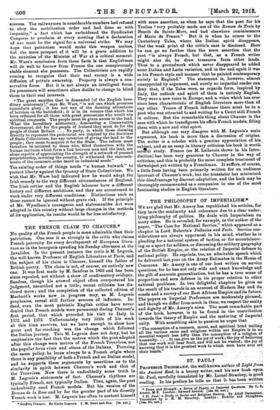THE FRENCH CLAIM TO CHAUCER.*
No quality of the French people is more admirable than their patriotism. One sees it as strongly in the critic who claims French paternity for every development of European litera- ture as in the bourgeois spending his Sunday afternoon at the Invalides. In the present instance the critic is M. Legouis, the well-known Professor of English Literature at Paris, and the subject of his claim is Chaucer, himself the father of British poetry. The claim is not, of course, an entirely new one. It was first made by M. Sandras in 1859 and has been since repeated, not without a show of confirmatory evidence. Sandras, though his avowed object often overpowered his judgment, unearthed not a little; recent criticism has dis- closed more; and the completion of the collected edition of Machant's works now in progress may, as M. Legouis prophesies, reveal OA further sources of influence. In- deed, even the most patriotic English critics have never denied that French models were paramount during Chaucer's first period, that which preceded his visit to Italy in 1372 and 1373. Unfortunately eery little of his work at this time survives, but we have enough to show bow great and far-reaching was the change which followed the Italian journey. This M. Legouis does not deny, but he emphasizes the fact that the metres which the poet adopted after this change were metres of the French Trouveres, not the popular terza rime and ottava of the Italians. Pursuing the same policy, he leans always to a French origin where there is any possibility of both a French and an Italian model, and be supports these arguments by assertions as to the similarity in spirit between Chaucer's work and that of the Trous:Tes. Now there is undoubtedly some truth in M. Legouis's statements of fact. Chaucer's rhythms are typically French, not typically Italian. Then, again, the poet undoubtedly used French models. But his version of the Roman de la Rose and by far the greater part of his directly French work is lost. M. Legouis has often to content himself • Geoffrey Chaucer. By Emile Legouis. J. M. Dent and Son. [Ss. net.] with mere assertion, as when he says that the poet for his Troilus "very probably made use of the Roman de Troie by
Benoit de Sainte-More, and had elsewhere reminiscences of Marie de France." But it is when he comes to the Canterbury Tales, where the Italian spirit disappears,
that the weak point of the critic's case is disclosed. Here he can go no further than the mere assertion that the pcet "is always French, but that, as a French writer might also do, he drew treasures from other lands. Thus to a groundwork which never disappeared he added some Italian and Latin variation, and in the end again it was in his French style and manner that he painted contemporary society in England." The statement is, however, almost unsupported by argument, and surely no impartial reader can deny that, if the Tales were, as regards form, inspired by Italy, the outlook and spirit of them is entirely English. They were a new voice in Europe, and a voice which has ever since been characteristic of English literature more than of any other. Traces of French influence there must be in a poet who was attracted to and writing for a Court still French in culture. But the remarkable thing about Chaucer is the ease with which he transfigures his effete French models, filling them with a new and vital spirit.
But although one may disagree with M. Legouis's main argument., his book is more than a discussion of origins. The writer is a scholar with a genuine appreciation of his subject, and as an essay in literary criticism his book is worth careful study. France (as M. Lailavois shows in his Intro- duction) has been very generous to Chaucer in the way of criticism, and this is probably the most complete treatment of the subjectyet written by a Frenchman. It suffers, of course., a little from having been primarily written for an audience ignorant of Chaucer's work, but the translator has minimized this disadvantage by discreet adaptation, and the book may be thoroughly recommended as a companion to one of the most fascinating studies in English literature.














































 Previous page
Previous page